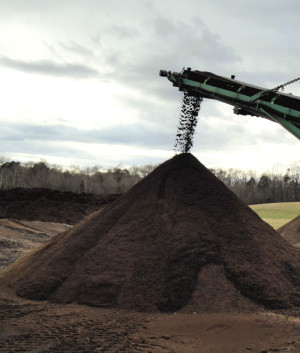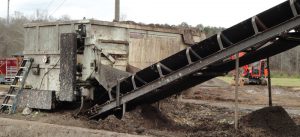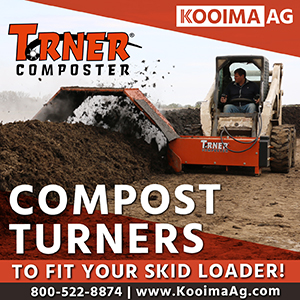Earth Farms Organics was born out of seeking a better solution to manage grease trap solids. Today, about 70,000 tons/year of food scraps, FOG and wood chips are processed.
Ryan Cooper
BioCycle May 2015
Earth Farms Organics (Earth Farms), in Dallas, North Carolina, is owned and operated by Jim Lanier, who began recycling organics in 1986 when he joined his father, William Lanier, at Stanley Environmental Solutions, a grease trap cleaning company. Grease trap waste was spread on the fields of the Lanier’s 110-acre farm, until they installed a dewatering system to separate the solids and the liquid. The resulting wastewater was spread on the fields and the solids were landfilled.
Jim Lanier took over the business in 2003 and pursued a different solution that he believed would be more beneficial for the environment and cost less — composting. In 2006, he applied to the North Carolina Department of Environment and Natural Resources (DENR) for a demonstration permit to compost food waste, yard trimmings, and grease trap solids. A year later, the company obtained a full-scale Large Type III Compost Facility Permit from the state.

A 6-acre active composting pad is lined with compacted clay. Windrows are turned by a BACKHUS compost turner. Photo by Ryan Cooper

Earth Farms’ compost (being screened above) is certified by the USCC’s Seal of Testing Assurance.
Photo by Ryan Cooper
Today, Earth Farms composts about 70,000 tons/year of food waste, FOG (fats, oils, and grease) and wood chips. It receives 40 to 50 tons/day of grease trap solids and 60 tons/day of food waste. Food waste generators include Charlotte-Mecklenburg Schools (see accompanying article), Johnson and Wales University and the Charlotte Convention Center. Wood chips are delivered or gathered from land clearing companies and local municipalities. Earth Farms produces about 35,000 cubic yards (cy)/year of finished compost. The composting operation has 10 employees.
Earth Farms received a $40,000 grant in 2014 from North Carolina’s Recycling Business Assistance Center to purchase a new organics collection truck. It procured a Brown Industrial food waste roll off truck that enables multiple collection containers to be emptied at the same time. A loading arm can also be used to lift dumpsters to be emptied. The grant paid for one month of training for food waste generators that sign up for collection. The company also conducts waste audits and supplies custom designed organics management systems, from 64-gallon containers to small dumpsters.
Operations, Markets
Earth Farms’ entire composting area measures roughly 20 acres. Food waste is accepted into a concrete pit and then mixed with wood chips in a ROTO-MIX 920-18 mixer. Compostable BioBags, cups and cutlery are accepted and break down completely during the composting process. A 6-acre active composting pad is lined with compacted clay. A pond to capture leachate is not necessary since the farm is grandfathered as a land application site.
Open windrows, 7-feet high, 16-feet wide and 300-feet long, are turned by a BACKHUS 6-series compost turner. The composting process includes a 10 to 12 week active cycle, and a 6 to 12 month curing time. Curing piles measure 20- to 25-feet high by 50-feet long and contain around 30,000 yards at any one time. Finished compost is screened to three-eighth-inch with a McCloskey 616 trommel and tested monthly by a laboratory at North Carolina State University.

Food waste is accepted in a concrete pit and then mixed with wood chips in a ROTO-MIX mixer.
Photo by Ryan Cooper
Earth Farms’ compost is certified by the US Composting Council’s Seal of Testing Assurance. Lanier is in the process of obtaining organic certification. In addition to compost, the company offers a topsoil blend (50/50 compost/local soil), a garden blend (compost, gypsum, rock dust and local soil with iron and sand additions), and a premium blend (compost, worm castings, and perlite). The products are carried at local retail locations and available for wholesale pick-up and delivery. The topsoil blend is the biggest seller; markets include landscaping, agriculture, horticulture, land reclamation and the North Carolina Department of Transportation. According to Lanier, North Carolina State University groundskeepers have made a shift toward organic management without chemical inputs.
Lanier touts the benefits of adding a quarter-inch layer of compost to agricultural land, or 6 to 12 cy/acre. Compost is donated to local farmers to demonstrate the benefits. Lanier cites the dollar savings from adding 3 to 5 percent organic matter to the soil and reducing the need for chemical fertilizer by 25 to 30 percent. One of the food waste generators from which Earth Farms collects is the supermarket chain Publix. Lanier notes that the retailer plans to promote the cycle of food waste to compost soon, illustrating what he calls “full circle recycling” — the closed loop of food waste to compost back to food production.
Composting at Earth Farms Organics is growing as more local businesses and institutions recycle their food waste. Lanier is planning to install a demonstration-scale aerated static pile system (ASP) and anticipates converting the whole operation over to ASP within one year to increase control over temperature, save space, and save money on fuel costs and time.
Ryan Cooper is a Project Associate at GreenBlue in Charlottesville, Virginia.













